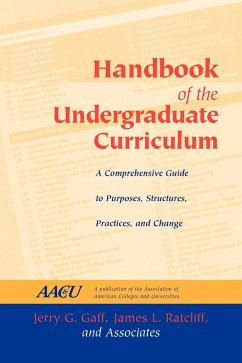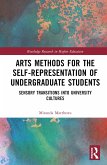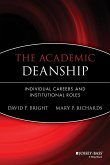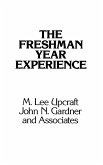This volume offers a compAndium of the best ideas, analyses, and practices relating to the undergraduate curriculum as described by leading figures in the field. The Handbook of the Undergraduate Curriculum contains both conceptual and practical information on effective practices, research, management, and assessment. In thirty-four original chapters, top practitioners and scholars detail a range of philosophies, frameworks, program designs, instructional strategies, and assessment methods being used to strengthen and transform the curriculum. They examine the current state of knowledge and teaching in the disciplines and the forces that will reshape the curriculum in the coming years.
Hinweis: Dieser Artikel kann nur an eine deutsche Lieferadresse ausgeliefert werden.
Hinweis: Dieser Artikel kann nur an eine deutsche Lieferadresse ausgeliefert werden.
?This book is a feast of current thinking, which is exactly howfaculty--who come to the table with many different viewpoints andinterests--need to be served.? (Russell Edgerton, president,American Association for Higher Education)
"Breathtakingly comprehensive in its reach--from the history andphilosophy of the curriculum to administration and assessment."(The Review of Higher Education)
?If policy makers, administrators, and faculty will use this bookto create common ground for discussion, we might succeed in makingthe necessary reforms in undergraduate education that will allowstudents to meet the future competently.This book will become anessential tool for any department, college, or campus wanting tomake significant change in undergraduate education.? (Reba L.Keele, professor of management, founding dean of undergraduatestudies, University of Utah)
?This book is a feast of current thinking, which is exactly howfaculty--who come to the table with many different viewpoints andinterests--need to be served.? (Russell Edgerton, president,American Association for Higher Education)
?Jerry Gaff and Jim Ratcliff have gathered a diverse and informedgroup of contributors to present an amazingly comprehensive sourceconcerning undergraduate curriculum. It should be of great value toanyone involved with college curriculum.? (Robert H. McCabe, seniorleague fellow, MacArthur Fellow, president emeritus, Miami-DadeCommunity College, League for Innovation in the Community CollegeEducation)
?This volume reflects the excitement and the significance ofcurrent changes and issues in the college curriculum. It will be anessential resource for anyone even tangentially involved inacademic change today.? (Daryl G. Smith, professor of education andpsychology, Claremont Graduate School, Claremont, California)
"Breathtakingly comprehensive in its reach--from the history andphilosophy of the curriculum to administration and assessment."(The Review of Higher Education)
?If policy makers, administrators, and faculty will use this bookto create common ground for discussion, we might succeed in makingthe necessary reforms in undergraduate education that will allowstudents to meet the future competently.This book will become anessential tool for any department, college, or campus wanting tomake significant change in undergraduate education.? (Reba L.Keele, professor of management, founding dean of undergraduatestudies, University of Utah)
?This book is a feast of current thinking, which is exactly howfaculty--who come to the table with many different viewpoints andinterests--need to be served.? (Russell Edgerton, president,American Association for Higher Education)
?Jerry Gaff and Jim Ratcliff have gathered a diverse and informedgroup of contributors to present an amazingly comprehensive sourceconcerning undergraduate curriculum. It should be of great value toanyone involved with college curriculum.? (Robert H. McCabe, seniorleague fellow, MacArthur Fellow, president emeritus, Miami-DadeCommunity College, League for Innovation in the Community CollegeEducation)
?This volume reflects the excitement and the significance ofcurrent changes and issues in the college curriculum. It will be anessential resource for anyone even tangentially involved inacademic change today.? (Daryl G. Smith, professor of education andpsychology, Claremont Graduate School, Claremont, California)








